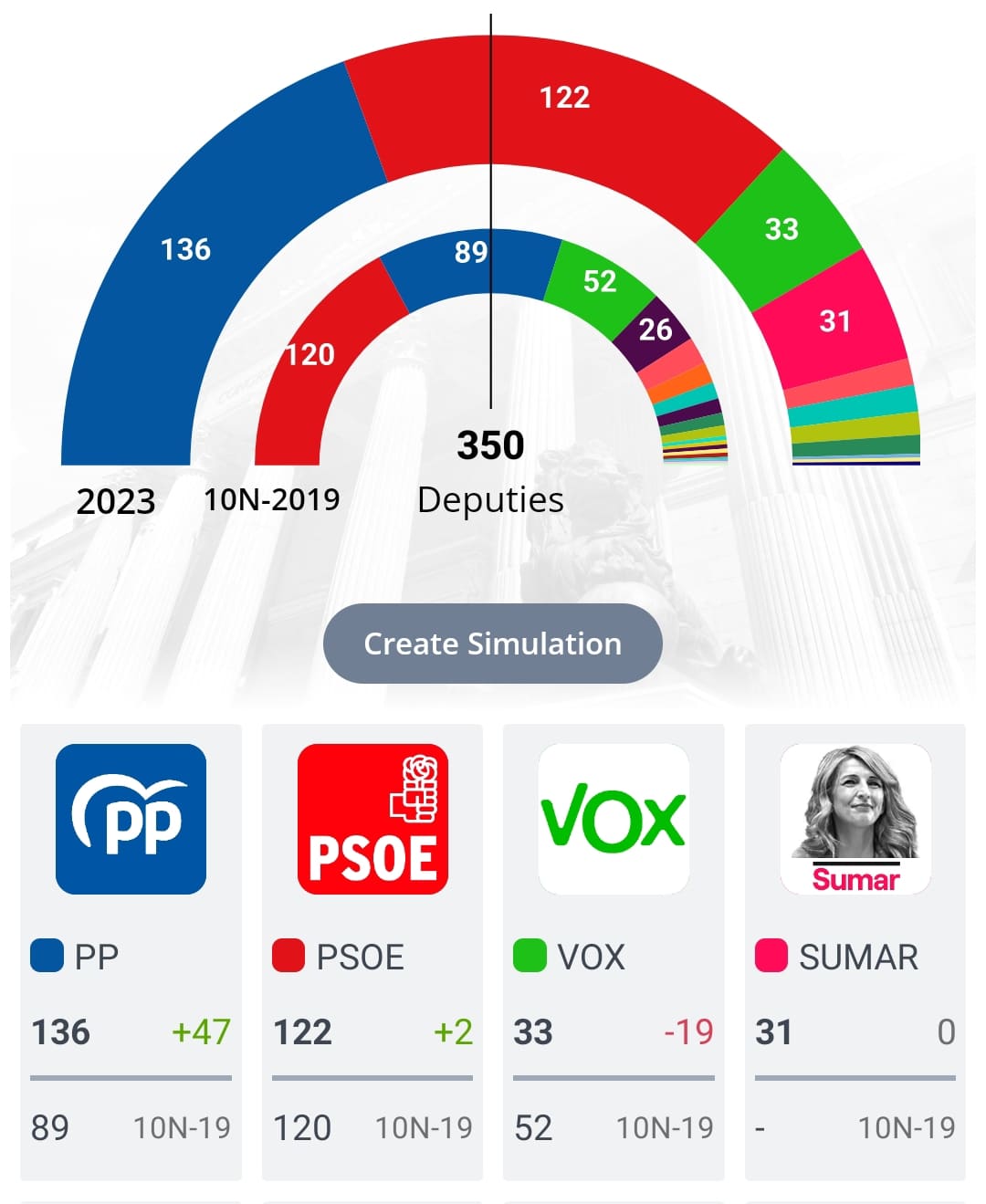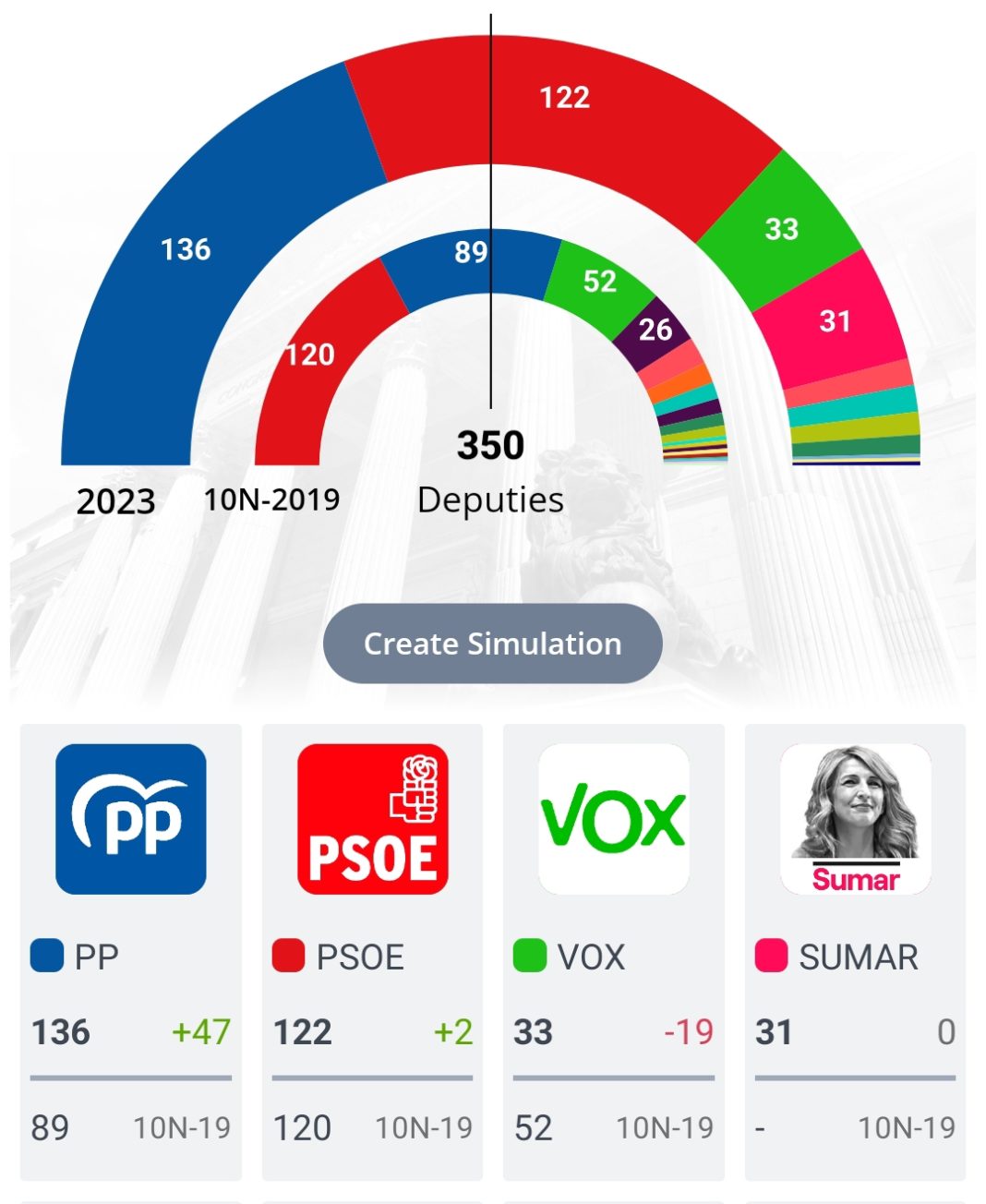The combined result for PP and Vox, with 169 seats, is 7 seats short of the absolute majority that they were confident of winning but despite winning the greatest number the PSOE and Sumar could still end up forming the next government with their partners, if they achieve the abstention of Junts, the Catalan political party
It seems that the Spain of 2023 is not quite ready to elect a right-wing government, with Santiago Abascal as vice president. Alberto Núñez Feijóo has fallen far short of his expectations with only 136 seats while the Pedro Sánchez revival provides another epic chapter in his career, resisting the votes of the right with 122 seats, two more than the PSOE achieved in 2019.

But the numbers are not enough to formalise the coalition government as it would need the abstention of the seven deputies of Junts, who during the campaign already warned that they would not support the government.
As such, Spain is currently ungovernable because neither Sánchez nor Feijóo have enough support to achieve an overall majority. The balance of the general elections is a deadlock. If the equation is not resolved with the talks between parties that take place from tonight, a second election could be held in a few months time.
Although overnight there was a glimmer with some early signs that there could be a government. The leader of Junts, Miriam Nogueras, appeared without slamming the door on Sánchez. “It is an opportunity, a new stage is opened for change, to recover our unity. We have to start doing things differently,” he said. “We will not make Pedro Sánchez the Prime Minister unless we receive something tangible in return. It will not be an exchange for nothing,” he said. And the Prime Minister himself, without containing his joy, in his first statements he was very clear: “There are more of us who want Spain to advance and so it will continue to be.” A statement that clearly indicates that he will try to reach an agreement with Junts.

Despite this, the PP claims its right to try to govern, after having been the most voted for party (the difference with the PSOE was under 300,000 votes). They emphasise that they have increased their support by 45 seats compared to 2019 and confirm that Feijóo will ask the rest of the parties for their support.
Contrary to forecasts, Feijóo has fallen far short of his own predictions (155) and Vox has lost support, falling from 52 to just 33 deputies, 19 less than four years ago. Sumar, the newly formed hard left party of Yolanda Díaz, could manages the left afloat with the PSOE despite gaining 4 seats less than Podemos did 4 years ago, with 31 parliamentarians compared to 35 in 2019.
So it would seem that most of the routes to Moncloa are currently in the hands of the PSOE and Mr Sanchez. The PP candidate, whom many had wanted to see as president of the Government, have rather fewer options to form the next government
The total achieved with Vox is just 169 seats, when the necessary majority is 176. And it can hardly call on any other support. Feijóo could only be invested with the abstention of the PSOE or the support of Junts which does not seem likely.
On the left, the progressive bloc, the PSOE and Sumar, have survived the conservative wave that seemed to emerge during the regional and municipal elections of 28M and have the advantage of having more partners in Congress. ERC, although its result has been poor, retains six deputies (it had 13); EH Bildu surpasses the PNV for the first time and this legislature will have another six, one more than in 2019. Just the one was lost by the Basque nationalists, who drop from five to four, fewer formations now than in 2019, a Parliament, therefore, less atomized.
The euphoria of the PSOE was uncontainable last night. Sanchez predicted a comeback and it has happened. It would seem that he has put a stop to the 28M crash. The PSOE has been supported by almost a million more Spaniards than in 2019.
For Feijóo and Sánchez time is now suspended, waiting to see if there is a progressive government thanks to Junts or if Spain is heading for yet another election. But, as happened in 2019, the Spain of 2023 is not the one reflected in the polls related to the conservative world.






